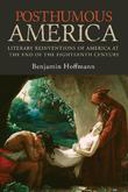Explore

Posthumous America examines the literary idealization of a lost American past. It investigates the reasons why, for a group of French writers of the 18th and 19th centuries, America was never more potent as a driving ideal than in its loss. For example, Hoffmann examines the paradoxical American paradise depicted in Crèvecœur’s Lettres d’un cultivateur américain (1784); the “uchronotopia” of Lezay-Marnésia’s Lettres écrites des rives de l’Ohio (1800)—the imaginary perfect society set in America and based on what France might have become without the Revolution; and the political and nationalistic motivations behind Chateaubriand’s idealization of America in Voyage en Amérique (1827) and Mémoires d’outre-tombe (1850). From an historical perspective, Posthumous Americas works to determine when exactly these writers stopped transcribing what they actually observed in America and started giving imaginary accounts of their experiences.
This book is included in DOAB.
Why read this book? Have your say.
You must be logged in to comment.
Rights Information
Are you the author or publisher of this work? If so, you can claim it as yours by registering as an Unglue.it rights holder.Downloads
This work has been downloaded 392 times via unglue.it ebook links.
- 92 - pdf (CC BY-NC-ND) at OAPEN Library.
- 233 - pdf (CC BY-NC-ND) at Unglue.it.
Keywords
- France
- François-René de Chateaubriand
- Indigenous peoples of the Americas
- KUnlatched
- Lezay
- Literary Criticism / Modern / 18th Century
- Literary studies: c 1800 to c 1900
- Literary studies: general
- Literature
- Literature & literary studies
- Literature: history & criticism
- New World
- thema EDItEUR::D Biography, Literature and Literary studies::DS Literature: history and criticism::DSB Literary studies: general::DSBF Literary studies: c 1800 to c 1900
- United States
Links
DOI: 10.5325/j.ctv3znxwdEditions

